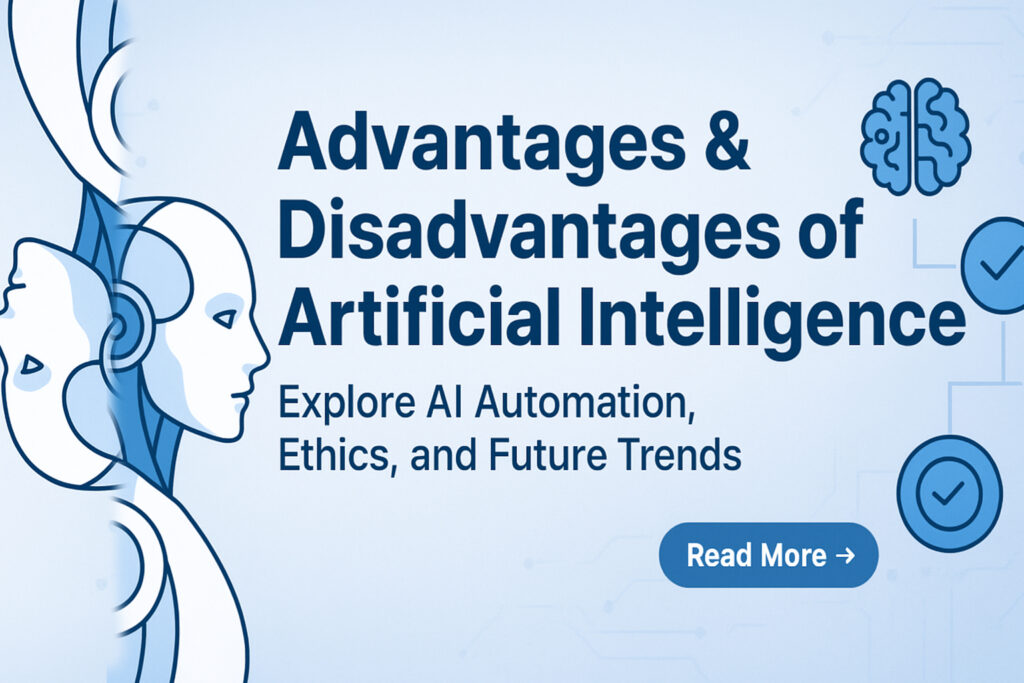Advantages and Disadvantages of Artificial Intelligence

Introduction: What is Artificial Intelligence and Why It Matters?
Artificial Intelligence (AI) has become a vital part of our daily life. Also, it is changing how we work, communicate, and solve problems. From smart assistants like Siri and Alexa to self-driving cars, AI is everywhere. But what exactly is AI, and why should we care?
AI refers to machines or systems that can learn, reason, and perform tasks usually done by humans. In addition, it powers healthcare tools, business solutions, and even entertainment apps. While AI offers many advantages, it also brings challenges that affect jobs, privacy, and ethics. In this article, we explore the advantages and disadvantages of artificial intelligence, AI automation, the future of AI, and ethical challenges.
Advantages of Artificial Intelligence
AI provides several benefits that make it a game-changer for individuals and businesses alike.
1. Efficiency and Speed
AI can process large volumes of data in seconds. As a result, tasks that take humans hours or days are completed quickly, increasing productivity and reducing errors.
2. AI Automation
In addition, AI automation handles repetitive tasks like customer support, manufacturing, and data entry. Businesses can save time, cut costs, and improve accuracy.
3. Enhanced Decision-Making
AI can analyze patterns and predict outcomes. Therefore, companies can make smarter decisions, optimize operations, and forecast future trends.
4. Healthcare Advancements
Doctors use AI to detect diseases early, personalize treatments, and monitor patient progress. Also, AI improves accuracy and efficiency, saving lives in many cases.
5. 24/7 Availability
AI systems do not get tired or need breaks. Hence, they provide constant service, which is useful for customer support, online platforms, and industrial operations.
⚠️ Disadvantages of Artificial Intelligence
Despite its benefits, AI has limitations and risks.
1. Job Displacement
AI automation can replace human jobs, especially in manufacturing, retail, and data management. Therefore, workers may need new skills to remain competitive.
2. High Implementation Costs
Developing and maintaining AI systems requires investment in technology, infrastructure, and skilled personnel. As a result, small businesses may struggle to adopt AI.
3. Lack of Emotional Intelligence
AI cannot feel emotions, empathize, or think creatively. Hence, professions that require human interaction, creativity, or judgment cannot be fully automated.
4. Overdependence on Technology
Relying heavily on AI can reduce human skills and problem-solving abilities. In addition, organizations may become vulnerable if systems fail.
5. Security and Privacy Risks
AI collects vast amounts of data. Therefore, improper handling can lead to privacy breaches, data theft, or misuse.
AI Automation in Daily Life
AI automation affects our everyday activities:
-
Smart Homes: AI manages lights, appliances, and security.
-
E-commerce: AI recommends products based on user behavior, increasing convenience.
-
Transportation: Self-driving cars and traffic systems improve safety and efficiency.
-
Business Operations: Chatbots, automated emails, and workflow software save time and reduce human errors.
However, while AI automation improves efficiency, it also raises concerns about privacy, security, and job replacement.
Future of Artificial Intelligence
The future of AI is promising yet complex. Experts predict:
-
AI will revolutionize healthcare, education, and transportation.
-
Also, it will enhance robotics, space exploration, and climate change solutions.
-
AI will create new business models and opportunities for startups.
Nevertheless, regulations are essential to prevent misuse and ensure ethical AI development.
Ethical Challenges of AI
AI’s rapid growth raises important ethical questions:
-
Bias in Algorithms: AI can produce unfair results if trained on biased data.
-
Job Losses: How will society handle unemployment caused by automation?
-
Surveillance and Privacy: AI-powered systems can violate personal privacy.
-
Autonomous Weapons: Should AI be used in military applications?
Therefore, responsible development and regulation of AI are crucial.
Frequently Asked Questions (FAQ)
-
What are the main advantages of artificial intelligence?
AI improves efficiency, enables automation, supports better decision-making, and benefits healthcare, business, and daily life. -
What are the disadvantages of artificial intelligence?
AI can replace human jobs, requires high investment, and raises privacy and ethical concerns. -
How is AI automation used today?
AI is used in smart homes, online shopping recommendations, chatbots, self-driving cars, and business operations. -
What is the future of artificial intelligence?
AI will transform healthcare, education, transportation, robotics, and climate solutions while creating new business opportunities. -
What ethical challenges does AI present?
Challenges include bias, unemployment, privacy risks, and military misuse. -
Can AI replace human creativity and empathy?
No. AI cannot replicate emotions, creativity, or ethical judgment. -
Why is AI automation important for businesses?
It saves time, reduces errors, and enables scalable operations, making businesses more competitive.
Conclusion
Artificial Intelligence is a double-edged sword. Its benefits, such as AI automation, improved decision-making, and 24/7 efficiency, can transform industries and daily life. However, disadvantages like job displacement, ethical dilemmas, and privacy concerns must be managed carefully. By using AI responsibly and applying regulations, society can maximize benefits while minimizing risks.
